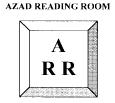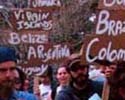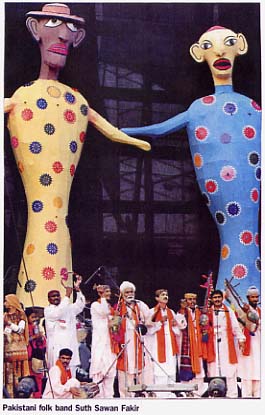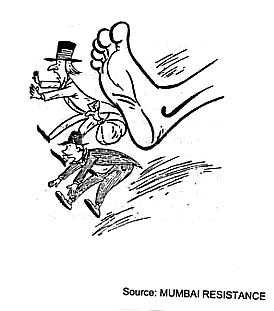Azad Reading Room


NEW ADDRESS:
AZAD READING ROOM
Aman Vedika, 11-1-809/1, Chinta Bavi
(lane beside Sridevi cinema hall),
Chilakalaguda, Secunderabad,
AP-500061 INDIA
Cell phone: 011 91 934 6988 639
91 40 2007 0143 (Land line phone)
E-MAIL: [email protected]
Azad Reading Room
[Secunderabad]
NEW
Bharat Samajh: Understanding India
India
Report
NEW
World Social Forum -– WSF 4
An Interpretive Note
JULY 2004
INTRODUCTION:
Social movements have existed for a long time. Debate, discussion and actions, often combined as forum(s) have been there over the same period. More recently, since the 1970’s, a vast documentation has appeared regarding the nature of the nation-state, civil society and the role/function of non-governmental organizations. In such a context modernity/ modernization has been investigated in order to understand, engage with and influence the content/direction of societal change.

PHOTO SOURCE: Frontline
On one side are the agencies/programs of corporate globalization engaged in
extending the ‘rule of capital’. On the other side, in opposition,
is a wide array of alternative agencies and programs calling for ‘another
world is possible’. Both streams of social forces are located within a
systemic foundation of the relations of capital – private property and
law. The terrain of contact is one of contention at times overtly intense and
at others somewhat dormant. The contention between the social forces is about
the core features of the contemporary dominance of capital as well as the institutional/organizational
modes of resistance and adjustment.
Over the past four years World Social Forums have been held annually. In 2004
the anticipation was immense. Expectations were high. When the time finally
arrived (January 16-21,’04) a substantive number of attendees came to Mumbai
(India). Estimates suggest that over 100,000 attended the World Social Forum
(WSF4) while 70,000 to 80,000 were actual registrants. These numbers match those
that attended WSF (Porto Allegre, Brazil) during 2003.
There are two main phases
in the organizing effort for the World Social Forum. First, between the late
1970’s and early 1990’s (the context being the petro-shocks of the
1970’s accompanied by widespread social conflict), there was an initial
coming together of critics identified as ‘regulationists’ and ‘structuralists’; the former demanding policy reform while the latter calling for institutional change. Second, inspired by the socio-political challenges developing in Brazil
(mainly from the workers and landless peasants), accompanied by the indigenous
peasant uprising in Chiapas (Mexico) and at almost the same time the governance
changes in South Africa. Throughout this 2nd phase the resistance of the Palestinians
underscored the importance of petro-gas resources with an emergent demand for
direct control of energy with political self –determination. These two
social currents converge at the beginning of the new millennium expressing opposition
to the World Economic Forum (annual gathering of corporate leaders and heads
of state) and announcing alternatives in the form of a World Social Forum –
pithily stated in the banner statement, ANOTHER WORLD IS POSSIBLE (AWIP). The
banner statement underscoring an opposed objective to TINA (There Is No Alternative)
the much publicized policies/programs of the Thatcher-Reagan period.
Organization/Venue:
WSF4, located in a northern suburb of Mumbai, brought together all the activities at one site, which logistically was an improvement, compared to widely separated events in Porto Allegre (Brazil, WSF1, 2&3) as well as the Asian Social Forum (Hyderabad, India – 2003). The single locational site enabled participants and registrants to have the possibility of meeting each other at one place.
Programs were divided among plenary-like sessions, workshops, display events
and cultural activities (music, songs, dances, drama and films). Over five days
several score of events were happening each day making it virtually impossible
to attend preferred/chosen programs. The profusion was confounded by inadequate
and erroneous publicity – events listed/scheduled at a place & time
could not be found and accurate information was often not available at the Information
booths. Several plenary sessions and many workshops were sparsely attended while
most cultural presentations were crowded.
The energy level among the people attending remained high during the first 3
days and then dropped as a considerable number of the attendees left over the
4th and 5th days.
Participants & Organizers:
Diversity was clearly evident among the people who gathered at WSF4. People from all corners of the globe were visible in bursts of colors, shapes, sizes, ages and genders. Over the first 2-3 days exuberance expressed the mood among the participants. After the 3rd day and through the last day the effective harnessing of the energy of the social forces remained fractured and elusive. Many participants came away bewildered and disappointed by the gap between the expectations and their realization. Experiencing some of the contradictions over the 5 days led to feelings of alienation about the near chaos of organization.
Participants were mainly middle-to-low income people with a wide range of occupational
backgrounds. ‘People of color’ were the majority. The leadership and
organizers were mainly from the upper levels of the income categories with sharp,
obvious disparities between ‘developed’ and ‘developing’
country individuals/groups.
The gap between the leaders/organizers and the participants remains wide and
over the past 4 years (2001-2004) appears to be growing larger. At WSF4 this
aspect of disparity was most evident in the manner of some expressed attitudes
towards Dalit (popularly described by the term ‘tribal’ but accurately
to be understood as indigenous people) attendees.
The display booths for printed material, information documents, arts & crafts,
audio-video material, food and drink were the most useful features of WSF4.
Alternatives/Directions:
Having observed and participated in the WSF process
for the past several years I have, for the moment, arrived at the following
understanding:
1. At the level of the core leadership the tendency indicated by the term ‘Regulationists’
has consolidated its position. Effectively this segment of the WSF participants
are primarily concerned with reforming/restating the ‘rules of the game’
connecting the ‘developed’ and ‘developing’ worlds. Specifically
the arenas of trade, technology, finance and infrastructure are targeted for
adjustment towards delivering ‘development with a human face’. Perhaps
the clearest example of such an outcome is the current poverty reduction policies
of the World Bank. At the WSF4 certain aspects of such a viewpoint was expressed
in the presentations of Joseph Stiglitz (former Chief Economic Advisor to the
World Bank) and Emmanuel Wallerstein (Director – Braudel Center, SUNY,
Binghamton, N.Y.).
2. At the level of the ‘radical’ leadership the tendency indicated
by the term ‘Structuralists’ continued to state their position as
requiring changes in the global corporate structure through a, not always clearly
or systematically outlined, dismantling of the economic, political and social
institutions. Perhaps the position was best suggested, of course with differences,
in the presentations of Samir Amin (Third World Forum), Walden Bello (Global
South) and Prabhat Patnaik (CPI-M).Since the WSF does not issue concluding resolutions,
a sense of lack of direction alongside unease about ‘where to go’
and ‘what to do’ continues to remain a strong feeling among participants
as they left Mumbai after January 21,’04.
The following are some published comments:
"With its rather loose and uncoordinated structure, the WSF asks participant
organizations no questions about funding sources. The agencies that were kept
out at the apex could well have been present through any number of participant
organizations". (FRONTLINE. Feb.13,’04).
"Many of the centrally organized conferences and panel discussions in Mumbai
--- were rather sparsely attended. The featured speakers had been heard at earlier
gatherings and the themes addressed seemed to offer little by way of novelty".
(FRONTLINE. Feb.13,’04).
"There was prior to and during the Mumbai gathering considerable criticism
of the opaque forms of governance". (FROTLINE. Feb.13,’04).
"Differences between the two (Mumbai Resistance & WSF) also showed
up in the profile of the participants. The majority of the Mumbai Resistance
participants were peasant farmers and field based activists. ------ (In contrast)
the recently released ‘Profile of Participants’ shows that WSF participants
tend to be young, university educated, anti-imperialist and independent of political
parties". (FRONTLINE. Feb.13,’04).
"If ‘Another World is Possible’ the theme of this year’s
WSF meeting, we need to know what kind of other world". (FRONTLINE. Feb.13,’04).
"The gathering is huge and it is not possible to participate in all the
discussions & events of the WSF 2004. However, many people – urban,
rural and from every level of society – are here from Pakistan to take
part in the seminar". (Masood Kiyani, Pakistan – SAHARA TIMES. Jan.
31,’04).
"We are of the opinion that the movement needs clear-cut orientation against
globalization and WSF lacks that orientation. Moreover, the NGO’s form
the main structure of the WSF. But what are these NGO’s doing? They are
trying to divert and diffuse the sharpness of the people’s movement ----".
(Darshan Pal, Mumbai Resistance 2004 – SAHARA TIMES. Jan.31,’04).
The World Social Forum encourages the emergence of possibilities as:
"A world of peace, equality and security". (Ghizaal Haress, Afghanistan
– SUNDAY MID DAY. Jan 18, ’04).
"A World with equity, and prosperity with a dignity for workers".
(Umesh Upadhyaya, Nepal – SUNDAY MID DAY. Jan 18,’04).
"A World where people have autonomy and are able to live without outside
interference". (Emedie Gunduza, Zimbabwe. SUNDAY MID DAY. Jan. 19,’04).
"A World where normal people have access to decision making processes".
(Sarah Peracca & Toni Estrada, USA – SUNDAY MID DAY. Jan 19,’04).
"A World of peace and prosperity. We have to change the attitudes of those
whose buckets are full and are still overflowing". (Ayesha Aftab, Pakistan
– SUNDAY MID DAY. Jan.19,’04).
And finally:
"It were the unknown individuals who represented the true spirit of the
WSF". (Kalpana Sharma. THE HINDU. Feb.1,’04).
Certainly much work remains to be done particularly in North America. One aspect
of such an understanding is to mobilize more people. Here it is encouraging
to note the emergence of citywide Social Forums in both USA and Canada. In July’04
a Boston Social Forum is being held (see: www.bostonsocialforum.org). In the
Fall of 2004 several organizations in the Tri-city (Albany/Schenectady/Troy)
area of N.Y. State are exploring the possibility of holding a Social Forum around
the theme of ‘Civil Society, Militarization & Social Justice’.
MOBILIZE TO REALIZE POSSIBILITIES
TOWARDS SUSTAINED ALTERNATIVES
Suggested Readings:
1. Baierle, Sergio. "The Porto Allegre Thermidor?" in Panitch, Leo
& Colin Leys (eds.). SOCIALIST REGISTER, 2003. New York, MR Press.
2. Ehrenberg, John. CIVIL SOCIETY. 1999. New York, NYU Press.
3. HISTORICAL MATERIALISM. No.11/3. 2004.
4. Holmstrom,Nancy (ed.) THE SOCIALIST FEMINIST PROJECT.
2002. N.Y., MR Press.
5. Mertes, Tom (ed.) THE MOVEMENT OF MOVEMENTS. 2004. N.Y. Verso.
6. Pepper, David. ECO-SOCIALISM. 1993. London. Routledge.
7. Panitch, Leo & Colin Leys (eds.) SOCIALIST REGISTER 2004. N.Y., MR Press.
8. ________________________.SOCIALIST REGISTER 2005. (Forthcoming).
9. RUPE. THE ECONOMICS & POLITICS OF THE WSF. Mumbai, 2003.
10. Shah, S.A. (ed.). DEMOCRACY, ECONOMICS & POLITICS. 1996. Hyderabad, Azad
Reading Room.
11. Vanaik, Achin. "Rendezvous at Mumbai". NEW LEFT REVIEW. March-April,
2004.

About
the Azad Reading Room
Support
the Azad Reading Room
Bharat Samajh: Understanding India
India Report
Corporate Globalization
World Social Forum
Publications
Other
sites of Interest
HOME